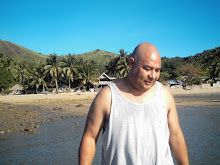Who is eligible to vote in the plebiscite? The Plebiscite Voter Registrar's Manual states that "Person's eligible to vote shall include those persons designated as Native Inhabitants of Guam or their descendants, defined within Chapter 21 of Title 3 of the Guam Code Annotated, who are eighteen (18) years of age or older on the date of the Political Plebiscite, and are registered voters of Guam". (Note: I could not find the manual on-line but found this excerpt from "statehoodforguam" website.)
Two important criteria about eligible voters: 1) they should be Native Inhabitants of Guam or their descendants; and 2) they are registered voters of Guam.
There is no question as to the second criteria. One must be registered to vote. So you pick up an application from the Guam Election Commission located on the second floor of the GCIC building in Hagatna, or register on-line at http://www.gec.guam.gov/.
However, the first criteria might require some clarification. Who is a Native inhabitant of Guam or his descendant? If you read Chapter 21 of Title 3 of the Guam Code Annotated (easily found on-line), page 3 under "21001. Definitions...", you will find definitions for "(c) Descendant" and "(e) Native Inhabitants of Guam".
A descendant "shall mean a person who has proceeded by birth, such as a child or grandchild to the remotest degree, from any Native Inhabitant of Guam...and who is considered placed in a line of succession from such ancestor where such succession is by virtue of blood relations". This is an important definition especially in light of the definition of a Native Inhabitant of Guam.
Native Inhabitants of Guam "shall mean those persons who became U.S. Citizens by virtue of the authority and enactment of the 1950 Organic Act of Guam and descendants of those persons". In 1950, who were those people of Guam who became citizens by virtue of the Organic Act? Were they only of Chamoru descent or also of Spanish, Japanese, Filipino, and all the other races that happened to be on Guam and wished to become U.S. citizens? While growing up on Guam, I knew many non-chamorus, who were Filipino and Japanese, that were U.S. citizens by virtue of the Organic Act. Many of these people had left their country and made Guam their home. They, and their descendants who still live on Guam and continue to contribute to the island's well-being, though not chamoru, are truly guamanians.
These people, I would say, meet the the requirements of the first criteria and should be allowed the opportunity to vote in the plebiscite.
But here's another equally important question: who should not vote? Well, aside from the obvious, i.e., being younger than eighteen years, those Chamorus who do not consider Guam their place of residence should not be allowed to vote in the plebiscite. This, of course, is my opinion and I, myself, am one of those Chamorus. I believe there is a good requirement in place, i.e., what is found in the manual, which properly limits what could be a considerable problem if chamorus who are not residents of Guam are allowed to vote. Then the question of non-chamoru guamanians and their descendants, retaining an affinity for the Island, would arise if they demand their right to vote. If they love Guam as much as we do, why should they not be allowed the right to vote, also? Another consideration is this: the political ramifications of this vote would be sweeping but would affect only the residents of Guam. Those of us abroad, who are not residents of Guam, would continue to abide by the politics of the states, provinces, etc. in which we live. Guam's political change would effect no immediate or direct change upon us.
Given what I believe are sound voter eligibility requirements in the Manual, the next question is which political direction best benefits the people of Guam. The Manual provides three choices: 1) independence; 2) free association; and 3) statehood.
Subscribe to:
Post Comments (Atom)

No comments:
Post a Comment